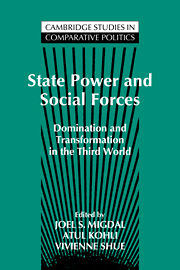Book contents
Introduction: developing a state-in-society perspective
Published online by Cambridge University Press: 05 June 2012
Summary
Comparative political study of developing countries is a scholarly subfleld that for nearly four decades has been in search of a theoretical core. Both modernization and dependency schools, as well as their debates, have come and gone. Over the last ten to fifteen years, a more state-oriented approach has instead attracted considerable attention. The present volume continues the dialogue with these intellectual traditions by offering a state-in-society perspective. Proceeding both at a general and at country-specific levels, the contributors to this collection hope to persuade others to move in several related but new theoretical directions: to go beyond “bringing the state back in” by resituating the study of states in their social setting and thus adopting a more balanced state-in-society perspective; to disaggregate states as objects of study, both as an end in itself and as a means toward a better understanding of states and political change; to rethink the categories used to conceptualize the evolving and fluid nature of social forces in developing countries; and to be continually sensitive to the mutually transforming quality of state–society relations.
Following the usual pattern for intellectual changes, our theoretical perspectives have developed as reactions to some prevailing scholarly tendencies. Although this volume does not attempt a critical evaluation of other schools of thought, but rather to develop a state-in-society approach, it may help the reader see where we are headed if we briefly recall some of the scholarly antecedents.
- Type
- Chapter
- Information
- State Power and Social ForcesDomination and Transformation in the Third World, pp. 1 - 4Publisher: Cambridge University PressPrint publication year: 1994
- 14
- Cited by

